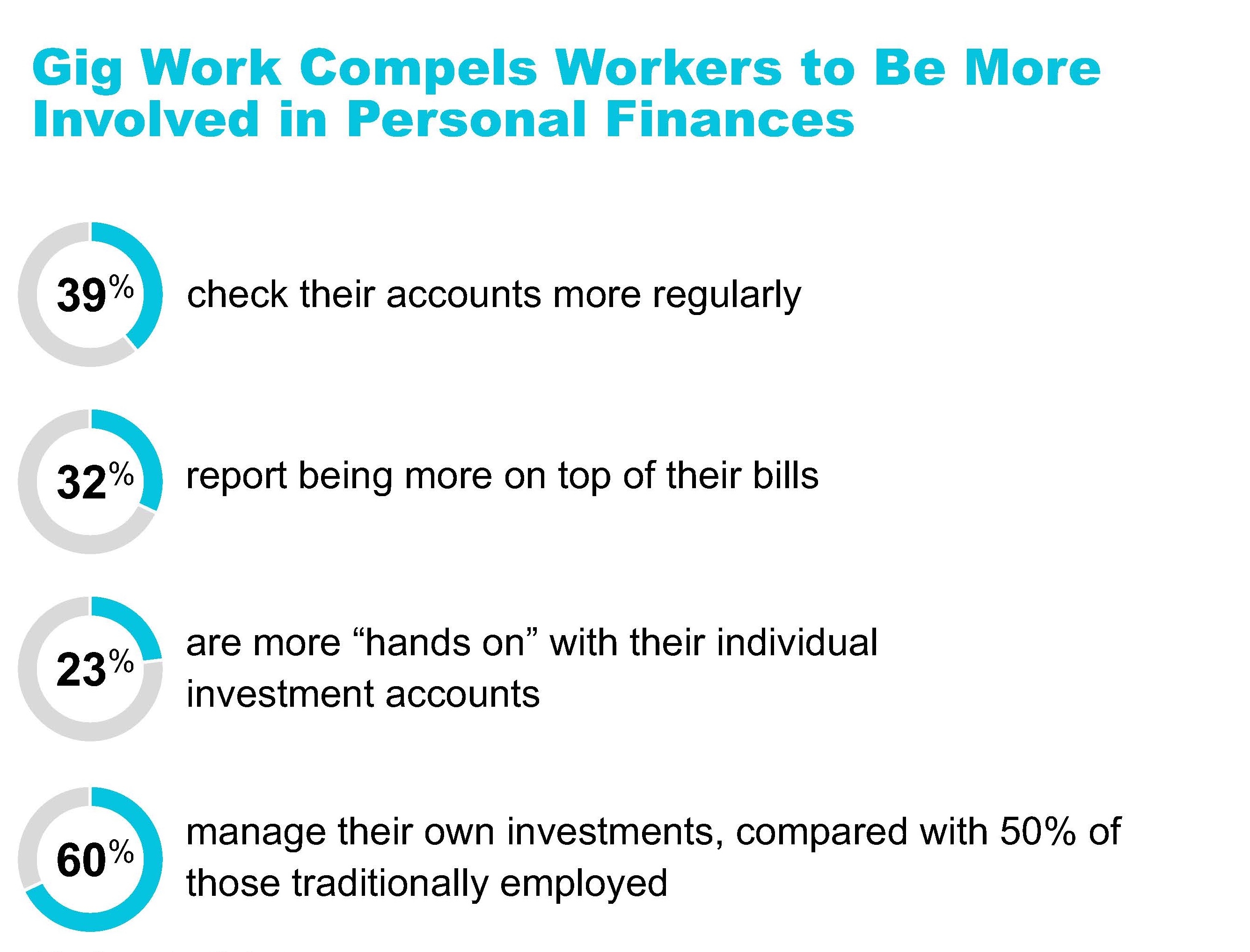NEWS
T. Rowe Price today released its first-ever survey about the gig economy, “2018 Financial Attitudes & Behaviors Toward the Gig Economy,” which found that 78 percent of gig workers consider themselves more involved in their personal finances as a result of participating in the gig economy. Thirty-nine percent of gig workers report checking their accounts more regularly, 32 percent are more on top of their bills, and 23 percent are more “hands on” with their individual investment accounts, since joining the gig economy. Gig economy employment is defined as independent full- or part-time work, including temporary, freelance, and contract employment, or business ownership.

Additionally, gig workers are more likely to be proactive with their finances than traditional workers, T. Rowe Price’s survey found. Among respondents with investable assets outside of an employer-sponsored retirement plan, 60 percent of workers in the gig economy report managing their own investments compared to 50 percent of those traditionally employed. The survey examined both traditional and gig workers’ financial behaviors and attitudes toward the growing gig economy trend. Twenty-five percent of survey respondents participated in the gig economy either full- or part-time at the time of the survey, with 68 percent participating as a choice and not out of necessity.
Additional findings of the survey include:
- Gig and traditional workers report similar levels of income. Twenty-eight percent of both gig and traditional workers cite an annual income of $75,000 or higher.
- The gig economy may be closing the employment gap for men and women. Based on survey responses, men led women in traditional full-time employment, with a 12-point difference, whereas the gap was smaller with a five-point difference between men and women working in the gig economy.
- Both gig and traditional workers consider their work satisfying. Eighty percent of gig workers are more likely to plan to continue working in some capacity after reaching retirement age, compared to 61 percent of traditional workers, with the majority of both gig and traditional workers stating they plan to continue to work because of personal satisfaction, versus a need to do so.
“Individuals participating in the gig economy are generally perceived as less financially stable, but it’s really encouraging to see that they are building similar levels of income as traditional workers,” said Stuart Ritter, senior financial planner at T. Rowe Price. “This may suggest that gig work offers an opportunity for workers to reach their financial goals. We were also surprised to see that workers participating in the gig economy span all generations, despite the perception that gig work is exclusively a trend among younger individuals. The gig economy seems to fulfill differing financial needs based on life stage, with younger workers using the income to cover daily costs and older participants applying the income toward their approaching retirement.”
THE GIG ECONOMY & GENERATIONAL VIEWS
- Motivation for participating in the gig economy changes with age. Older respondents participating in the gig economy were more likely to be motivated by work/life balance and less about money, with baby boomers twice as likely to participate for this reason compared to other generations.
- Generation X shows the highest rate of gig economy work participation. Thirty-two percent of Generation X respondents work independently in some capacity, compared to 18 percent of millennials and 26 percent of baby boomers.
- Millennials are less likely to view traditional work as secure. Twenty-six percent of millennials feel the gig economy offers more job security than traditional work, higher than both Generation X (18 percent) and baby boomers (15 percent).
- Among survey respondents, baby boomers expressed the most positive feelings about the gig economy. Baby boomers associated words such as “free,” “independent,” and “empowered” when describing how the gig economy makes them feel, more often than Generation X and millennials. However, a higher percentage of baby boomers are more likely to enter the gig economy out of necessity—43 percent—versus 23 percent of millennials and 33 percent of Generation X respondents.
ABOUT THE SURVEY
T. Rowe Price conducted the online national survey of 800 adults age 18 and older from Feb. 6-11, 2018. For results based on the total sample of national adults, the margin of sampling error is +/- 3.5 percentage points at the 95 percent confidence level.
ABOUT T. ROWE PRICE
Founded in 1937, Baltimore-based T. Rowe Price Group, Inc. is a global investment management organization with $1.02 trillion in assets under management as of February 28, 2018. The organization provides a broad array of mutual funds, subadvisory services, and separate account management for individual and institutional investors, retirement plans, and financial intermediaries. The company also offers sophisticated investment planning and guidance tools. T. Rowe Price’s disciplined, risk-aware investment approach focuses on diversification, style consistency, and fundamental research. For more information, visit troweprice.com, Twitter, YouTube, LinkedIn, or Facebook.